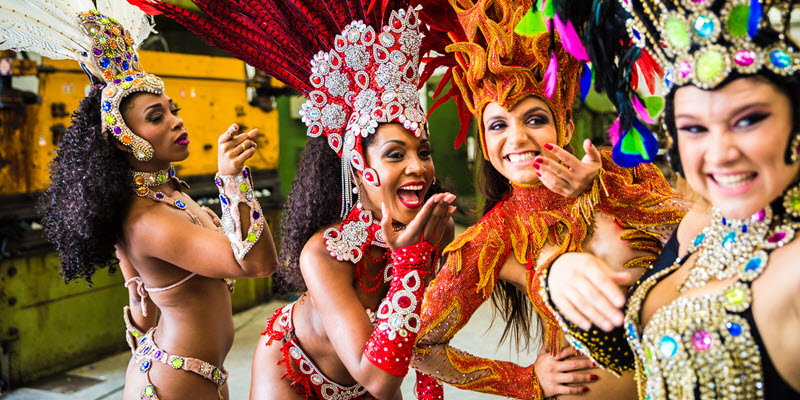| By Elizabeth Ferguson |
March 1st marked the beginning of another Carnival festival in Rio de Janeiro, Brazil, an extravagant five-day celebration leading up to the Catholic observance of Lent. A tradition in Rio since the late 1700s, Carnival combines art, music, and culture in an action-packed week of dancing, feasting, parading, and many other events. The city is known to attract upwards of a million people, both locals and tourists, for this annual event, and those who attend see a Rio bursting with color and life.
At the heart of Carnival celebrations in Brazil is lively samba music, a traditional Brazilian genre of music and style of dance with West African roots that can be heard throughout the streets during the many parades that take place over the course of the festival. More than a dozen samba schools participate each year, displaying their creativity through music, dancing, costumes, and parade floats and competing against each other for the championship title.
Estácio de Sá, a neighborhood of Rio, is a predominantly Afro-Brazilian area known for helping to introduce samba music into mainstream Brazilian culture and was the birthplace of Brazilian author and poet Paulo Lins. Having always been captivated by samba, Lins became a sambista (samba player) himself and wrote lyrics for several samba songs. Some of them even helped samba schools from Cidade de Deus, the city Lins and his family moved to when Lins was seven, win the coveted Carnival parade championship. Lins illuminates many aspects of samba in his writings, particularly in his novel Desde que o samba é samba.
Another Brazilian figure influenced by the culture of samba is author and screenwriter Nelson Pereira dos Santos whose film Rio, zona norte follows the exploitation of a lower-class sambista by middle-class music industry agents. Lins and dos Santos are just two examples of prominent Brazilian writers in the twenty-first century who are portrayed in Dictionary of Literary Biography, Volume 384: Twenty-First-Century Brazilian Writers. Also covered in this volume are authors such as Paulo Coelho, whose 1988 novel The Alchemist has established itself as a modern classic with more than two million copies sold, Adriana Lisboa, whose talents span from adult fiction to children’s literature to poetry, Esmeralda Ribeiro, an Afro-Brazilian author, journalist, and poet, and many, many more.
Don’t miss out on including this important addition in the Dictionary of Literary Biography series to your collection. Twenty-first century literature from around the world is a growing field of study both in high school English classes and university Literature courses. Students and general readers alike will benefit from this volume as it includes author profiles of 46 contemporary Brazilian writers and will certainly introduce readers to previously unknown authors, allowing them to discover new literature, poetry, and film. Dictionary of Literary Biography, Volume 384: Twenty-First-Century Brazilian Writers would be a wonderful expansion to any high school, university, or home library.
Meet the Author
Elizabeth Ferguson began her career at Gale in 2015 as an Associate Development Editor. She is now a Content Developer on the Academic Frontlist & Literature team, working on the Books to Film series and lending support to other ongoing projects.

